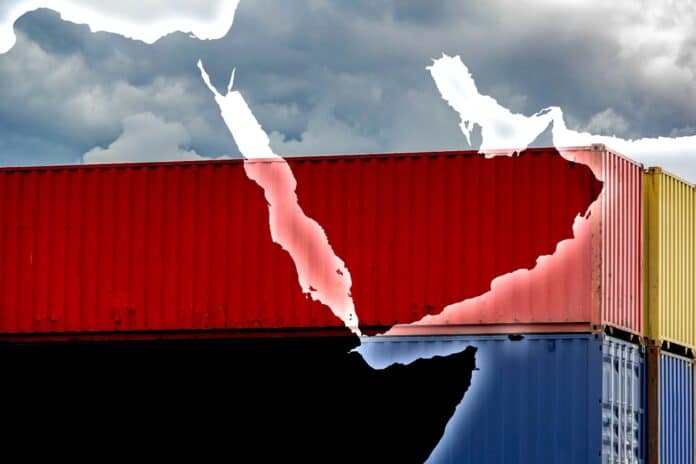The security problem faced by commercial ships in the Red Sea is causing companies to increase their insurance risks.
With recent Yemen-based Houthi rebels attacking Israeli and other ships in the Red Sea, where a significant part of world trade takes place, imports and exports have been seriously disrupted and limited in the region.
According to an assessment published by the United Nations Conference on Trade and Development (UNCTAD) in February, many ships are now avoiding the canal and changing their routes from the Bab al-Mandeb Strait to the Cape of Good Hope and choosing a longer route.
The evaluation states that the number of ships passing through the Suez Canal in January 2024 decreased by 42 percent.
This situation also causes companies’ insurance risks to increase significantly, with many experiencing insurance premiums increasing 7 to 10 times as high as previously assessed.
In the report, it was stated that fluctuating freight markets and interrupted deliveries put global maritime transportation under pressure, and the following statements were made:
“Increasing security concerns primarily means higher premiums for the insured. Ships are required to inform their insurers when passing through these regions where they are considered high risk, and they generally must pay additional premiums to obtain 7 days of additional coverage. As a matter of fact, because of the attacks on sea lines in the Red Sea, the risk of war. It is seen that the premiums increased from approximately 0.1 percent of the ship value to 0.7-1 percent.”
However, not only have premiums increased by 7-10 times, but the duration of war risk offers has also shortened significantly.
The previously implemented 7-day guarantee period has been reduced to 24 hours. “These practices bring additional costs of tens of thousands of dollars and reveal the impact of security concerns on insurance premiums.”
In the report, it was emphasized that many international insurance companies have recently announced that they have stopped providing war risk coverage for this region, and this situation causes fewer ships to pass through the region, further distressing the market and increasing premiums.
The conclusion: There’s not much that merchants can do to protect themselves in this current wartime climate.
It was stated in the report that there are very few precautions that a merchant ship can take to protect itself against weapons, and that changing the route and moving away from the area is considered the safest way, especially for ships at high risk. “It is a necessary decision. Even though ship owners may want to follow different routes to avoid the Red Sea as attacks and risks increase, ultimately it will be decided whether the voyage plans are commercially feasible or not depending on the terms of the charter party, bill of lading or other contract.” Evaluations were also included.
Additionally, in the statement, it was pointed out that there are some issues that ships that choose or must pass through the Red Sea can pay attention to, and the following was noted:
“First of all, the recommendations, warnings and updates of official authorities need to be strictly followed. For example, regarding the security steps that can be taken by ships, there have been some recommendations from the US Navy regarding night travel and turning off AIS. There are also recommendations in the Red Sea, Gulf of Aden, Indian Ocean and Arabian Sea.” Guidelines published by international authorities, such as Best Management Practices for Deterring Piracy and Improving Maritime Security in the Sea (BMP5), should be followed and implemented.
Choosing alternative routes doesn’t really decrease insurance costs much.
In the report, it was stated that choosing alternative routes to avoid paying high premiums brings almost the same cost, and that choosing safer but longer routes to avoid areas where there are safety concerns causes an increase in fuel consumption and travel time.
The report emphasized that the security risk in the Red Sea has now reached a crisis point, and said, “While some ship owners and charterers prefer to pass through the Cape of Good Hope as a medium-term strategy, others rely on the Houthis’ statement that they are targeting ships with connections to Israel, the United Kingdom and America, and the Red Sea.” It was added that “Searching for alternative markets and regions should also be seen as an option to distribute risks and reduce dependence on the Red Sea.” Expressions were used.




